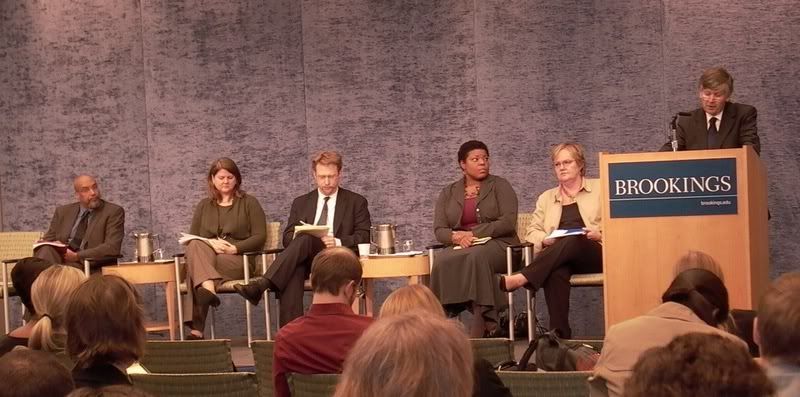Institute discusses Hurricane Katrina and human rights at Brookings
 Institute for Southern Studies Director Chris Kromm was one of the speakers at a Brookings Institution panel discussion held yesterday titled "Fires, Floods, Earthquakes and Tsunamis: A Human Rights Perspective for Major Natural Disasters."
Institute for Southern Studies Director Chris Kromm was one of the speakers at a Brookings Institution panel discussion held yesterday titled "Fires, Floods, Earthquakes and Tsunamis: A Human Rights Perspective for Major Natural Disasters."
Other panelists at the event, held at Brookings' Washington headquarters, were Walter Kaelin, representative of the United Nations' Secretary General on the Human Rights of Internally Displaced Persons and a member of the U.N. Human Rights Committee; Monique Harden, co-director of Advocates for Environmental Human Rights in New Orleans; Ajamu Baraka, director of the Atlanta-based U.S. Human Rights Network; and Linda Poteat of InterAction, a coalition of U.S.-based humanitarian aid organizations. The panel was moderated by Elizabeth Ferris, senior fellow of foreign policy at Brookings.
The event marked the public kickoff of Kaelin's five-day visit to the United States to learn about the challenges faced in the aftermath of a disaster as catastrophic as Hurricane Katrina. At the invitation of Advocates for Environmental Human Rights, Kaelin will be meeting with displaced persons across the Gulf region and leading training sessions to help public officials understand their obligations under human rights standards. He plans to make similar visits later this year to disaster-stricken regions of Latin America, Africa and Asia.
In conjunction with Kaelin's visit, the Institute will formally release a report on Katrina and human rights at a press event scheduled for tomorrow in New Orleans. Titled "Hurricane Katrina and the Guiding Principles on Internal Displacement: A Global Human Rights Perspective on a National Disaster" [PDF], the report by Kromm and Institute Editorial Director Sue Sturgis was produced in collaboration with the Brookings-Bern Project on Internal Displacement and marks the most in-depth study produced to date on the Principles' applicability to the ongoing Katrina crisis.
Completed in 1998 by Dr. Francis Deng of the Sudan and embraced by the United States and the rest of the international community, the 30 Guiding Principles draw on existing international law to outline human rights protections for those displaced by disasters and conflict through three phases: before displacement, during displacement, and in the return, reintegration and resettlement of those displaced. The Institute report documents how the U.S. government and other authorities failed to adhere to basic provisions of the Guiding Principles before, during and after Katrina, and it offers recommendations for how the government can protect the right of return for those still displaced by the storm and prevent human rights abuses during future disasters.
The report "makes a valuable contribution in analyzing the response to Katrina-induced displacement in light of accepted normative standards," Ferris wrote in her foreword.
To watch C-Span's video of the event, click here and scroll down to "Recent Programs."
(PHOTO: Walter Kaelin, representative of the United Nations' Secretary General on the Human Rights of Internally Displaced Persons, speaks at the Jan. 14 Brookings Institution panel discussion on human rights and disasters. From left to right, the other panelists included Ajamu Baraka of the U.S. Human Rights Network, Linda Poteat of InterAction, Chris Kromm of the Institute for Southern Studies, Monique Hardin of Advocates for Environmental Human Rights, and moderator Elizabeth Ferris of Brookings.)
Tags
Sue Sturgis
Sue is the former editorial director of Facing South and the Institute for Southern Studies.
